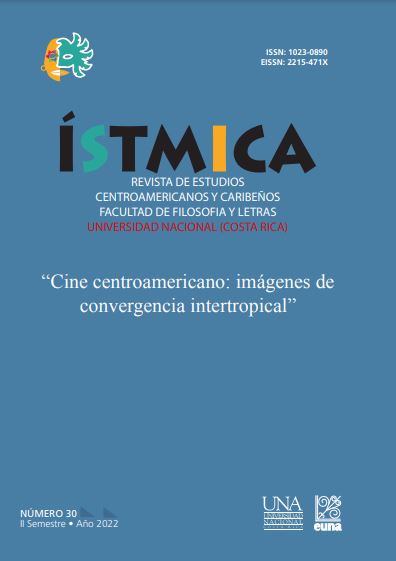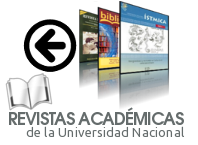Take the house: Politics of haunting, counter-archive and indigenous resistance in La llorona, by Jayro Bustamante
DOI:
https://doi.org/10.15359/istmica.30.5Keywords:
Indigenous resistance, decoloniality, counter-archive, disappeared, politics of haunting, La Llorona, Jayro BustamanteAbstract
The feature-film La Llorona (Jayro Bustamante, 2019) aims to rectify a historical debt to Guatemalan indigenous people, a debt that was not paid by the 1996 Peace Accords. The specter of the past is embodied in Alma, a Mayan Kaqchikel servant working in the home of General Monteverde, a man responsible for genocide against indigenous communities. Inverting the concept of haunting, this time it is the torturer and his family who are tormented by past deeds, deeds that had until then remained in a state of moral and juridical impunity. The metaphorical figure of “La Llorona” cries inconsolably from a space beyond death for her children who were assassinated in front of her eyes. Her mourning catalyzes a process of popular justice against Monteverde and his family,
as a mounting crowd of protestors surrounds the expresident’s palace and demands justice for the disappeared. The mansion itself turns into a suffocating space that attacks its residents forcing them to reckon with the past. This article interrogates three fundamental aspects of the film. First, it takes up the audiovisual counter-archive in the 2013 trial of Ríos Montt, upon whom the character of Monteverde is based. Second, it discusses how the politics of haunting transcends the film genre of horror and becomes a form of political drama. Finally, it analyzes the decolonial visions proposed by the film as options for a democratic Guatemala.
References
Auchter, Jessica. The Politics of Haunting and Memory in International Relations. Nueva York: Routledge, 2014.
Brett, Roddy. “Peace Without Social Reconciliation? Understanding the Trial of Generals Ríos Montt and Rodriguez Sánchez in the Wake of Guatemala’s Genocide”. Journal of Genocide Research, 18, nº 2-3 (2016): 285-303.
Burt, Jo-Marie. “From Heaven to Hell in Ten Days: The Genocide Trial in Guatemala”. Journal of Genocide Research, 18, nº 2-3 (2016): 143-169.
Burt, Jo-Marie y Geoff Thale. “With Ríos Montt Trial Partially Annulled, Justice and Rule of Law Hang in the Balance”. International Justice Monitor, 11 de junio, 2013. https://www.ijmonitor.org/2013/06/jo-marie-burt-and-geoff-thale-the-guatemala-genocide-case-using-the-legal-system-to-defeatjustice/
Cabello del Moral, Pedro. “IXCANUL, una mirada kaqchikel contra el neoliberalismo y el neocolonialismo”. Istmo. Revista virtual de estudios literarios y culturales centroamericanos, 36 (2018): 67-89.
Camhaji, Elías. “Para Hollywood los latinos ya no somos solo consumidores de telenovelas, fútbol y narcohistorias”. El País, 24 de febrero, 2021. https://elpais.com/mexico/2021-02-25/para-hollywood-los-latinos-ya-no-somos-solo-consumidores-de-telenovelas-futbol-y-narcohistorias.html.
Castro Sáenz, Emiliano. “Jayro Bustamante: ‘Me interesa mostrar quiénes somos y cuáles son nuestras raíces”. El Magazín Cultural, 18 de agosto, 2021. https://www.elespectador.com/el-magazin-cultural/jayro-bustamante-me-interesa-mostrar-quienes-somos-y-cuales-son-nuestras-raices/.
Cholakian, Daniel. “Jayro Bustamante: ‘La llorona nació como una Guatemala cansada de llorar a sus desaparecidos, como una madre tierra cansada’”. Nodal. Noticias de América Latina y el Caribe, 19 de febrero, 2021. https://www.nodal.am/2021/02/nodal-pregunta-jayro-bustamante-cineasta-guatemalteco-la-llorona-nacio-como-una-guatemala-cansada-de-llorar-a-sus-desaparecidos-como-una-madre-tierra-cansada/.
Cojtí Cuxil, Demetrio. Políticas para la reivindicación de los mayas de hoy. (Fundamento de los Derechos específicos del Pueblo Maya). Ciudad de Guatemala: Cholsamaj, 1994.
Colmeiro, José F. Memoria histórica e identidad cultural: de la postguerra a la postmodernidad. Barcelona: Antrophos, 2005.
Crosby, Alison, M. Brinton Lykes y Brisna Caxaj. “Carrying a Heavy Load: Mayan Women’s Understandings of Reparation in the Aftermath of Genocide”. Journal of Genocide Research, 18, nº 2-3 (2016): 265-283.
Derrida, Jacques. Specters of Marx. Nueva York: Routledge, 1994.
Gaborit, Mauricio. “Memoria histórica”. ECA: Estudios Centroamericanos, 61(2006): 663-684.
Hirsch, Marianne. The Generation of Postmemory: Writing and Visual Culture After the Holocaust. Nueva York: Columbia University Press, 2012.
Hirsch, Marianne y Leo Spitzer. “‘We Would Not Have Come Without You’: Generations of Nostalgia”. American Imago 59, nº. 3 (2002): 253-276.
Jardín, Xeni. “Guatemala: ‘I am innocent,’ Ríos Montt tells court in genocide trial, breaking silence”. Boingboing, 9 de mayo, 2013. https://boingboing.
net/2013/05/09/guatemala-i-am-innocent.html.
Labanyi, Jo. “History and hauntology; or, what does one do with the ghosts of the past? Reflections on Spanish film and fiction of the post-Franco period”.
En Disremembering the Dictatorship: The Politics of Memory in the Spanish Transition to Democracy, editado por Joan Ramón Resina, 65-82. Amsterdam: Rodopi, 2000.
Lugones, María. “Colonialidad y género”. Tábula Rasa, 9 (2008): 73-101.
Mbembé, Achille. “Necropolitics”. Public Culture, 15, nº 1 (2003): 11-40.
Moleón, Marta. “Jayro Bustamante: ‘En Guatemala se llama comunista a todo al que se considera enemigo del Estado’”. La razón, 13 de noviembre, 2020. https://www.larazon.es/cultura/20201113/d5wsetnmnbh2pa7wh7vadvo5ce.html.
Moraña, Mabel. El monstruo como máquina de guerra. Madrid/Frankfurt: Iberoamericana/Vervuert, 2017.
Motha, Stuart y Honni van Rijswijk. “Introduction: A counter-archival Sense”. En Law,Memory, Violence. Uncovering the Counter-Archive editado por
Stuart Motha y Honni van Rijswijk, 1-15. Nueva York: Routledge, 2016.
Oglesby, Elizabeth y Diane M. Nelson. “Guatemala’s Genocide Trial and The Nexus of Racism and Counterinsurgency”. Journal of Genocide Research,18, nº 2-3 (2016): 133-142.
Quijano, Aníbal. “Colonialidad del poder, eurocentrismo y América Latina”. En La colonialidad del saber: eurocentrismo y ciencias sociales. Perspectivas
Latinoamericanas, compilado por Eduardo Lander, 201-246. Buenos Aires: Consejo Latinoamericano de Ciencias Sociales-UNESCO, 2000.
Ribas-Casasayas, Alberto y Amanda L. Petersen. “Introduction: Theories of the Ghost in a Transhispanic Context”. En Espectros: Ghostly Hautings in Contemporary Transhispanic Narratives, editado por Alberto Ribas Casasayas y Amanda L. Petersen, 1-11. Lewisburg, PA: Brucknell University Press, 2016.
Ribas-Casasayas, Alberto y Amanda L. Petersen. “Ghostly Encounters: Haunted Histories”. En Espectros: Ghostly Hautings in Contemporary Transhispanic Narratives, editado por Alberto Ribas Casasayas y Amanda L. Petersen, 13-15. Lewisburg, PA: Brucknell University Press, 2016.
Schwab, Gabriele. Haunting legacies: Violent histories and transgenerational trauma. Nueva York: Columbia University Press, 2010.
Song, May. “‘La Llorona’ Director Discusses Film Themes, Reimagining Latinx American Legend”. University Wire, 21 de agosto, 2020.
Stoler, Anne Laura. “On Archiving as Dissenssus”. Comparative Studies of South Asia, Africa and the Middle East, 38, nº 1 (2018): 43-56.
Published
How to Cite
Issue
Section
License
Las personas autoras que publiquen en esta revista permiten cesión gratuita, exclusiva, de ámbito mundial de sus derechos de autoría a la Universidad Nacional (Costa Rica), conservando únicamente sus derechos morales sobre la obra publicada.
Los artículos pueden ser citados y copiados, citando a la persona autora y la fuente. Todos los artículos publicados en la Revista Ístmica están protegidos bajo una Licencia Creative Commons Atribución-NoComercial-CompartirIgual 4.0 Internacional








